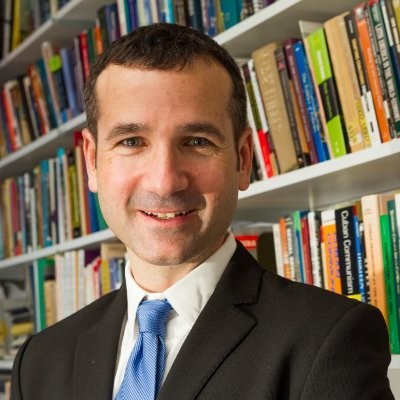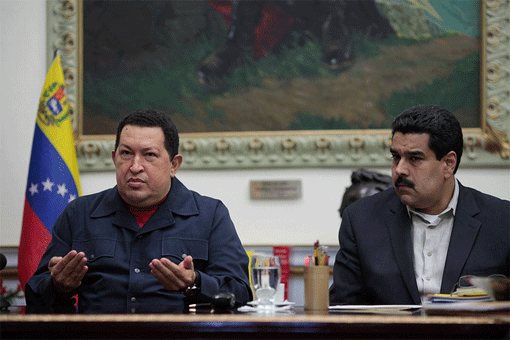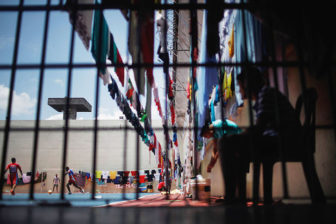After much speculation President Hugo Chávez announced on December 8 that his cancer was back (for the second time in a year), and that he now had a person in mind to succeed him—Nicolás Maduro, the minister of foreign affairs who was elevated to vice president in October 2012.
Designating Maduro as the official successor was, as political scientist María Teresa Romero said, both expected and surprising. Anointing Maduro was expected since he had become Chávez’ closest political figure, frequently seen right next to the president, especially when traveling to Cuba for treatment. The constitution also says that Maduro, as vice-president by special designation of Chávez himself, takes charge if the president is ever permanently absent from office.
If Chávez is unable to complete his new six-year term within the first four years, the constitution stipulates that a new election must be called within 30 days. In this case, it is now clear that Maduro would be the preferred candidate for Chávez’ Partido Socialista Unido de Venezuela (PSUV).
The Venezuelan political system, which is a mixture of democracy and autocracy, has now officially entered the moment of succession—a process that varies significantly between the two political systems. In democracies, successions are determined by constitutions, while in autocracies, successions are always indeterminate and fraught with uncertainty and the potential for crisis.
Still, if the constitution is clear about this process, and Chávez was already frank about whom he wanted for vice-president, why bother to interrupt his “urgent” treatment in Cuba, postpone surgery for a few days, and return to Venezuela to make the announcement that Maduro was his preferred successor? To be finally so public and emphatic about his choice was a shock. Why not tweet the news from Cuba, or better yet, remain quiet, as he had been doing thus far?
With his dramatic announcement about Maduro, Chávez indirectly admitted that Venezuela is an autocracy by implicitly recognizing that the country is suffering from a succession crisis. Chávez had seen the signs of the crisis before. Each time he traveled to Cuba for treatment, vicious internal speculation about succession would metastasize within the PSUV.
Chávez must have been told in this last trip to Cuba that this type of political competition within chavismo, like Chávez’s cancer, is lethal. Cuban doctors would try to take care of the recurring cancer, but only Chávez could take care of the recurring succession crisis. Chávez then knew that he needed to appear on national television to appoint Maduro, and thus contain this crisis.
In the end, Chávez gave Venezuela the gift of clarity by seeking to prevent a succession crisis. He also gave Maduro the gift of a lifetime, saving him from what would have been his first potential crisis as presidential candidate, namely internal sabotage. Chávez was clear: all Venezuelans (meaning all chavistas) must vote for Maduro.
The day after the announcement (on December 9), the PSUV held a special meeting in Caracas. Attendees included Maduro, the president of the National Assembly and the PSUV’s first vice-president Diosdado Cabello, and the candidates for governorships in the December 16 elections. They signed on to a document expressing unidad, but the question is whether their pledge of unity will stand the test of time.
It is likely that that the PSUV will grant Chávez his wish, and if the time comes, vote for Maduro for no other reason than to pay their last respects. But it is less certain whether this loyalty will be automatically extended to Maduro if he assumes office.
So who is Maduro, and will he ever command the loyalty of chavistas?
In many ways Maduro is everything that Chávez represents, as well as its opposite. He is the Revolution’s most two-faced character. On the one hand, he is one of the most leftist and anti-imperialist figures in the PSUV—the architect of some of Venezuela’s most radical foreign decisions such as close ties to Libya, Syria and Iran. On the other hand, he can be soft-spoken and conciliatory. He is the architect of the remarkable turnaround of relations with Colombia in the last two years and is the third longest-serving foreign relations minister in the Americas. He has acquired experience, and might have even learned, on the job, the importance of pragmatism. He also has a good relationship with the military, but unlike Chávez, he is not one of them.
The multiple sides of Maduro are worth remembering in trying to predict how he would deal with two inescapable political problems as president. The first is what to do with the opposition, which is stronger than ever. Here, Maduro is more likely than Chávez to understand the need to talk with his opponents, which is good news and bad news for them. More government-opposition talk could help bring some moderation to public policy, but greater discussion may also split the opposition.
The second challenge is how to deal with the multiple factions within chavismo. One faction is the military, whose institutional presence has never been higher and whose patience with the politiquería of Venezuela and the PSUV has never been lower. A day after Chávez spoke about Maduro, the armed forces publicly reiterated their loyalty to Chávez the “person,” to the “Revolution,” and to the “people” (without mention of loyalty to the vice-president or even to Chávez’ wishes). Another faction is the very corrupt business tycoons who have amassed uncountable profits making deals with the state and have the influence to cause trouble. The third faction is the radical ideologues who want a more extreme revolution than Chávez ever delivered. They have passion and impatience, and thus, capacity to also cause trouble.
These factions won’t disappear if Chávez disappears from politics, and it’s unclear how Maduro as president would manage them. Chávez dealt with internal factions by blaming others for any setback, offering huge rewards to those who laughed at his jokes, and suppressing dissent from within. As Teodoro Petkoff, editor of Tal Cual, once famously remarked, nowhere is freedom of expression more lacking in Venezuela than within the ranks of chavismo.
In dealing with these factions, Maduro will face two epochal choices: either introduce political competitiveness within the PSUV to allow the internal currents to fight among themselves, or impose order from above. If he chooses the former, he may end up being a one-term president. If he chooses the latter, he may survive in office longer, but he will have no choice than to imitate some of the hardline practices that his protégé deployed to unify his band of followers.
No two political leaders are ever identical, and Maduro will never be another Chávez. But if the Venezuelan regime remains unchanged, the forces pressuring for convergence in rulership, and especially in dealing with dissent, will also remain the same.









